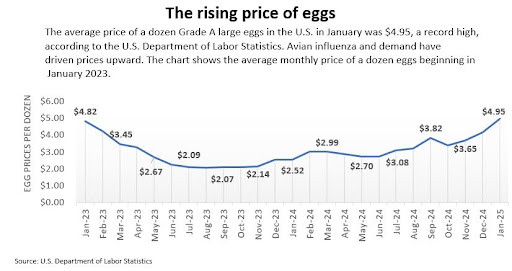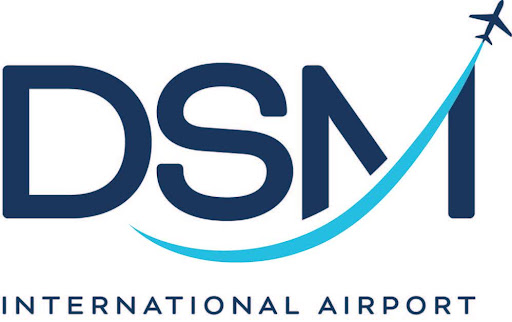For now, restaurants absorbing high cost of eggs
Managers don’t want high menu prices to keep customers at home

Kathy A. Bolten Mar 7, 2025 | 10:46 am
3 min read time
828 wordsAg and Environment, All Latest News, Economic Development, Retail and Business
About three months ago, restaurant manager Stacy Dullard paid $37 for 180 farm-fresh eggs.
Today’s price for the same number of eggs? $122, a more than threefold increase since December.
“That’s significant,” said Dullard, general manager of HomeGrown Des Moines-Crescent at 555 17th St.
In January 2024, the average price of a dozen Grade A large eggs in the U.S. was $2.52, according to the U.S. Department of Labor Statistics. A year later, the price had soared to $4.95, a record high.
The most recent increase in the price of eggs began in October, when the average price of a dozen large eggs was $3.37. Average prices have increased every month because of large-scale, ongoing outbreaks of the highly pathogenic avian influenza, or bird flu. The outbreak began in early 2022 and is now considered the largest bird flu outbreak in U.S. history.
Since February 2022, nearly 166.2 million birds that were part of flocks in which the disease was detected have been slaughtered in the U.S., according to data released Tuesday by the U.S. Department of Agriculture. Most of the slaughtered birds were egg-laying hens. In February, there were 357 million egg-producing hens in the U.S., 5% fewer than a year ago, according to the USDA.
The decrease in hens – and eggs – has caused the price of eggs to skyrocket to record levels. A USDA food price outlook forecast released in late February indicates egg prices will likely continue to grow at above-average rates.
The gloomy outlook prompted national restaurant chains Waffle House and Denny’s to add temporary surcharges on meals that include eggs. Retailers, including Costco and Trader Joe’s, have either put limits on the number of eggs a customer can buy or have stopped selling the product.
Dullard, the HomeGrown manager, said the restaurant is resisting passing the higher egg prices on to customers. Instead, the restaurant is absorbing the cost, she said.
“Our customers are suffering as well at the grocery store,” said Dullard, who estimated the restaurant uses an average of 7,000 eggs a week. “We don’t want to price ourselves out of our community’s ability to eat with us regularly.”
Kendall Owen, corporate food and beverage director for Early Bird, a breakfast and brunch restaurant with three Des Moines-area locations, also is hoping to avoid raising the menu prices of egg-based meals. In recent weeks, he estimated he’s paid about 80 cents per egg, up dramatically from the 8 to 12 cents per egg he paid in much of 2024.
“You wanted to make everything out of eggs because they were so cost-effective,” Owen said. “For the price to be where it is now is pretty dramatic. … With a concept like ours that goes through hundreds and hundreds of eggs every single day, it does take a toll. We’re just absorbing it and letting it cut into our natural profit margin.”
Owen said the restaurant doesn’t want to take steps that will push customers away.
“What we really want is for the price to come back down and things to go back to some level of normalcy,” he said.
Owen said the restaurant won’t add surcharges. If egg prices don’t drop in the coming weeks, “we may need to print new menus with some increases in prices. We don’t want to do that. … People are cost-conscious now. When you increase prices, you just make people stay home more.”
For omelets and pancake and waffle batter, Early Bird purchases eggs already “out of their shell,” Owen said. The company buys those eggs on contract. Owen said the restaurant signed its most recent nine-month contract in November, when prices were lower. “We are fortunate in that case.”
Jessica Dunker, president and CEO of the Iowa Restaurant Association, said many of the restaurant owners she knows are trying “to go as long as possible without raising menu prices.”
Typically, chickens begin to lay eggs when they are around 18 weeks old, according to several university extension services. If producers can keep new flocks healthy, “then hopefully we’re looking at a one-quarter problem financially for restaurants,” Dunker said. If the outbreak lasts longer, restaurants will be forced to raise prices, she said.
HomeGrown is owned by the Thrive Restaurant Group, based in Wichita, Kan. The company can likely weather the crisis for the foreseeable future, Dullard said.
The price of eggs “does hurt, but we’re not going to shift that burden onto our customers by increasing prices or adding an egg surcharge,” Dullard said. “We’re just going to ride it out and see how it goes.”
More online: In late February, the U.S. Department of Agriculture announced a $1 billion strategy to curb bird flu, protect the U.S. poultry industry, and lower egg prices. To learn more about the USDA’s plans, click here.

Kathy A. Bolten
Kathy A. Bolten is a senior staff writer at Business Record. She covers real estate and development, workforce development, education, banking and finance, and housing.










